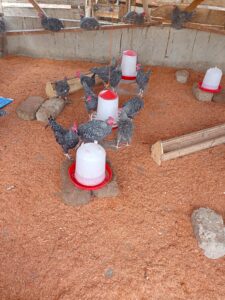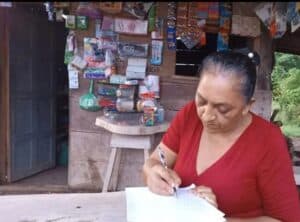Infant Malnutrition and What Our New Program is Doing About It: Growing Healthy Food, Growing Healthy Children
by Katie Jackson, Communications Intern, and Megan Sehr, Development Director
In Roger Thurow’s recently published book, The First 1,000 Days, Thurow shows how improper nutrition during a child’s first three years can have a devastating impact on that child’s future. In order to give children the best opportunity to reach their fullest developmental potential, Thurow demonstrated that attention to nutritional health during prenatal development and lactation are both absolutely critical. Calorie and protein requirements must be met from prenatal development to weaning, and babies should be exclusively breastfed for the first six months to safeguard against infant malnutrition. The lack of both protein rich foods and proper breastfeeding practices have compounded in the infant malnutrition problem observed by Self-Help’s staff in the villages we serve in Ghana.
Infant malnutrition results in stunting, a condition that causes children to never reach their full potential as adults. Stunting not only makes children shorter – it also impacts their brain development in ways that can’t be overcome by better nutrition later in childhood or adulthood. Infant malnutrition also causes children to be more susceptible to infection, which kills many babies during their first few years of life.
 All of this creates a cycle of lower potential and productivity as each generation grows into adulthood just as malnourished as the generation before it. This all has very real economic consequences for the community and country as a whole.
All of this creates a cycle of lower potential and productivity as each generation grows into adulthood just as malnourished as the generation before it. This all has very real economic consequences for the community and country as a whole.
Reports from Self-Help International’s school feeding program in Ghana have shown amazing results, including improved school attendance and increased test scores. However, our staff have noticed that many of the children participating in the school feeding program are already stunted by the time they’re starting school, which means serious developmental damage may have already occurred. In order to stop the chain of malnutrition and poverty, children must be reached through interventions before their third birthday.
That is why Self-Help International has launched a new pilot program, Growing Healthy Food, Growing Healthy Children, aimed at training expectant and new mothers about the importance of nutrition for their babies. The program targets the health and nutrition of children before they are born, through infancy, and into the first few years of life.
We have designed a plan working with local farmers to grow food that will improve infant weaning and provide a more adequate diet for pregnant and lactating women. This plan is based on consultations with new mothers and healthcare professionals in the villages we serve, as well as researchers working in Ghana and our staff specialists. Based on growth data

Participants of the New Program
from schools and demonstrated commitment of the community members, we are launching this pilot intervention in the village of Beposo.
The program includes over 50 women and has two main components: teaching mothers about the importance of breastfeeding and proper nutrition, and supplying food insecure mothers with enough to feed their babies.
Through group classes and one-on-one counseling, our staff in Ghana is teaching mothers about what they need to do to ensure their babies will be healthy. We are teaching the new mothers that their nutrition during pregnancy is important for their babies’ development in the womb. We’re also promoting breastfeeding for at least the first six months after their child’s birth as an alternative to just giving their children water and fufu (which lacks the same nutrients as breastfeeding and often uses dirty water).
The other side of the program is focused on creating more food security for both mother and baby. We are providing supplemental food packets of porridge during pregnancy and lactation since it’s difficult to farm as an expectant or new mother. We are also incorporating an allotment of eggs for the children while they are weaning and educating the community about the value of vitamin A rich orange-flesh sweet potatoes.
At the same time, our agricultural training team is teaching intercropping of QPM with cowpeas or groundnuts to increase the protein content of the porridge, as well as partnering with regional experts to teach farmers to grow orange-flesh sweet potatoes. The next step will be to introduce poultry production in the village using accepted methods for both family food and income generation through our micro-credit and farm input loan mechanism. This will enable Beposo to provide its own supply of eggs for infant weaning, and it will allow the inclusion of 3 hard cooked egg yolks per week in the diet of the weaning infants.
In order to track our progress and effectiveness, we’re monitoring the mothers’ weight gain during pregnancy, and the length and weight measurements of the babies. We’re tracking the quality of their dietary intake and the food security of their home to make sure the mothers have the resources they need to utilize what they’re learning in the trainings.
With help from community leaders and healthcare professionals, the goal of this project is to ensure that no child in Beposo is stunted by the time they reach 2 years old. Other dual focus programs with an emphasis on nutrition education and improved harvest, that have been enacted in Ghana, have shown that supporting one mother will improve the health of all of her future children, even after the program ends – effectively alleviating the cycle of infant malnutrition!
We’ve got more information about this program here and here!

 Next Post
Next Post


